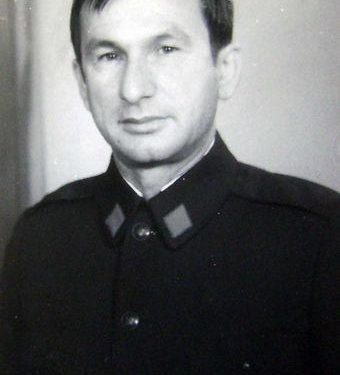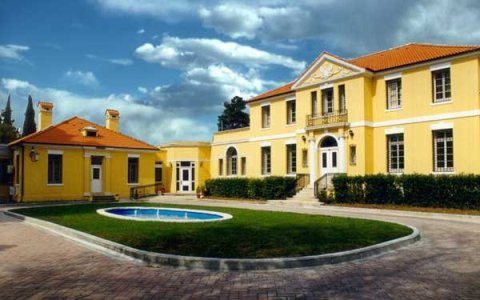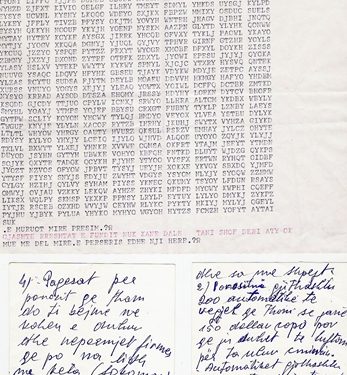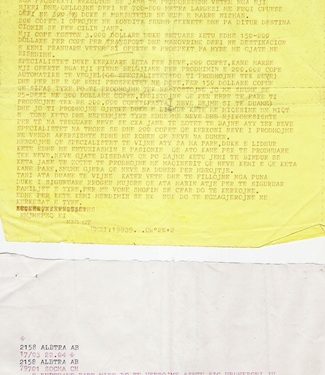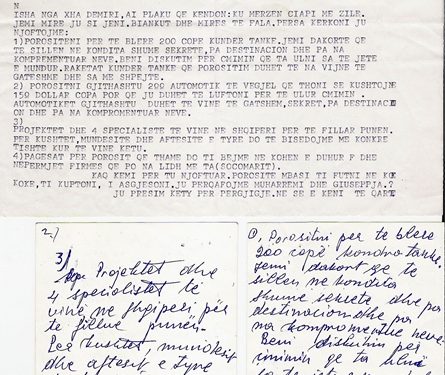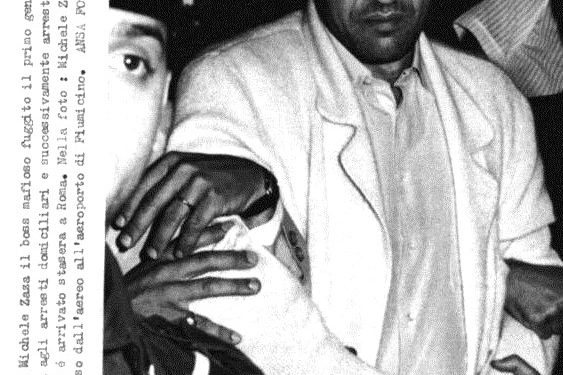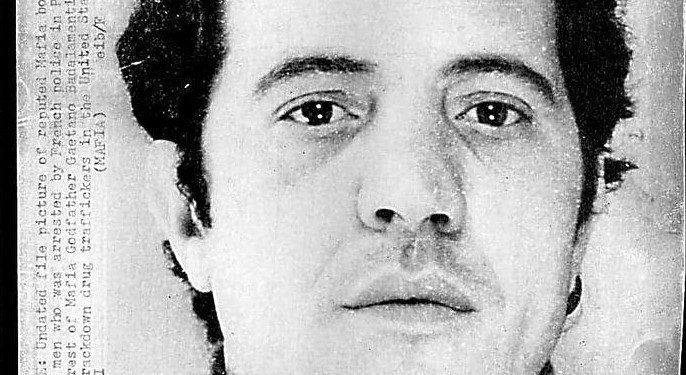By Robert Cipo
“How and why did the State Security eliminate his two associates, who had been working for years in the two most important embassies in Tirana?!
Memorie.al / Over 20-year connections of Albanian officers with the Neapolitan mafia. How were anti-tank and automatic weapons produced and trafficked for urban warfare? Where did the earned dollars go and how were bank transactions carried out? For more than two decades, Italian organized crime and the Albanian State Security have actively cooperated. The authentic documents, which we are presenting to the reader, show that the Neapolitan “Camorra” and the State Security cooperated in the trafficking of combat weapons, automatic weapons suitable for urban guerillas (the so-called popular partisan war in residential areas). It also cooperated on the trafficking of weapons against armored vehicles of the “anti-tank missile” type.
Almost 4-5 years had passed since I had finished writing the Monograph on my own life, and I still couldn’t find a publisher. I started dealing with finding a publisher to print the book. I referred you to a friend of mine who had dealt with this work and he was the one who recommended to me a friend of his, an unknown publisher, whom he brought to my house one morning to talk.
During the conversation, I found out that on the way to my house, talking between them, my friend and his publisher friend, the latter had found out that I had worked as a translator at the Italian Embassy and when he came to me, said: “I am the son of Idrizi, the former gardener of the Embassy, who, as you may remember, died during the period when he was working at the Embassy, and I with my father’s savings, after democracy came here, I started to deal with publications.”
All this, he was telling me with a strange smile, as if he wanted to say; “my father is a gardener and you had bequeathed thousands of dollars, of course you, as a translator, will not be without anything”! In the meantime, with the intervention of a cousin, I found another publisher and the book was published, but from time to time the gardener’s son came to mind. I remembered that, when I was working as a typist at Hospital No. 1 in Tirana, Idriz Muço also came to work as a gardener, with whom I became friends.
I remember that one morning Idrizi met me in the hospital flower beds and told me that he had been transferred as a gardener to the Italian Embassy. I, after several years spent as a laboratory assistant at the Institute of Hygiene (since I was practically not allowed to carry out any more responsible work, due to the fact that I had been permanently excluded from all schools in Albania and unable to continue higher education), I was offered to move in 1974, to the service of the Service Office of the Diplomatic Corps, since I was well versed in foreign languages.
Someone I went and consulted with told me that all Albanian employees of embassies should all be agents-informants, or “Security Collaborators”. This scared me beyond measure and I did my best to prolong as much as possible the answer to the proposal that was addressed to me to work as a translator at the Cuban Embassy. But there came a moment when this situation could not last any longer. Two years had passed.
It was now 1976 and I needed a quick and definitive answer. Then I went to the Foreign Ministry and asked for a meeting with a friend of my brother, who had also been a diplomat in Austria and Yugoslavia, and I presented the matter to him, telling him a few things; that I did not want to become an informant for the Security.
He laughed and told me; “don’t even think that you will become an informer or a collaborator. In every Embassy, we have found a person, Albanian or foreigner, I am not saying this, from the most insignificant ones and who is constantly on the move, to open their eyes and give us information, in case they will be required. You stay calm and work honestly. Others are just rumors and spread to scare people.
So I worked for five years with the Cubans in Italian, at their own request, and later in Spanish, which I learned there. After all these years, I was told that I should go to the Italian Embassy, since they were not finding anyone with that language, who would comply with the conditions required to work in the Embassy. I became interested in what these conditions could be. First of all, they told me that you shouldn’t be a communist. In the second place, not even any other member of the family should be a communist.
I was surprised, because I thought it should be quite the opposite. They explained to me that from time to time, there were meetings of the Central Committee of the PPSh and there they dealt with important problems for our country, but these meetings or Plenums (as they were called) started to be published in the press of the time, only after at least two had passed -three years, so they had lost relevance. In this way, the Albanian employees of the embassies, even if they wanted to, had no opportunity to hear the discussions and especially the decisions of the Plenums.
However, based on the conversation with my fellow diplomat at the Ministry of Foreign Affairs, I continued working regularly, without worrying about anything else. As the days passed, I noticed something rather strange. The Embassy gardener, Idriz Muça, although we had known each other since we worked together at the Hospital, had started to become quite serious.
Even when I talked to him about common and family problems, he fell short and always found reasons to leave, that; “I have a lot of work”. But on the other hand, I watched him spend the day walking around the fruit trees in the Embassy garden and constantly eating from them, since the Italians themselves did not touch the fruits of the garden with their hands, because they considered it a shame, for a diplomat to eat from the trees of the garden, while he had the opportunity to buy them at a cheap price, at the diplomat’s store.
Idrizi often told us that since the territory of the garden was quite extensive and full of grass, when the hot period of summer came, he was always afraid that the grass could catch fire from a spark or from the heat of the environment. So often in the summer period, he did not come home at all, he was also spending the night at the Embassy, guarding the territory from any burning. We were also impressed when we gathered one day at the Directorate of the Diplomatic Office, because a new employee was introduced to us at the premises of the Italian Embassy.
Since she did not know a word of Italian, she asked other embassy employees to help her understand the requirements of the Italian staff, as well as whatever she needed for her activity. Even before the N/Director had finished speaking, it was Idriz Muça who took the floor, declaring that; would help this new employee. Everyone had turned to me to hear what I was going to say and were surprised by Idrizi’s words, that the “gardener” was taking it upon himself to help him.
All those present at the meeting started to laugh and thought that it should be the translator, the one who should be committed to helping this young employee. When everyone started laughing, only then did Idrizi, realizing that he had violated him, completed it by saying, not only me (Idrizi) but also the translator (Berti). Only 30 years later, we found out that it was Idrizi, the Sigurimi associate, who would have the young employee under his command, and he was practically not wrong to have intervened to ensure his support.
But no one knew about these problems and we took his intervention as social. At the same time, we learned from him that the second gate of the embassy, which was located next to the Faculty of Foreign Languages, was open day and night, as diplomats’ cars entered and left there hourly. He even shot once, that a Roma who had five or six horses, passing the night by the side of the embassy and seeing the grass of the garden unharvested, as well as the door of the garden open, had put the horses there to graze and he himself was lying in a corner of the garden and fell asleep.
Idrizi, who usually came to work at 6 o’clock in the morning, had seen the horses, had woken up the sleeping Roma and taken them out through the back gate, without anyone knowing what had happened. From that moment a guard was posted at that door as well, although the gate remained always open.
In front of the Italian Embassy, on “Elbasani” Street, at that time there was also the French Embassy. An Albanian gardener worked there as well, who took care of a garden, much smaller than that of the Italians.
But as far as we could see, he was always arguing with a French employee, who was an administrator, arguments that we couldn’t understand why they were caused, while the Albanian employee was always calm and smiling. This gardener of the French, at a young age, because he should not have been more than 40-45 years old, after some time, he started to get sick and one day we were informed that he had died. We all went to his funeral. He lived on the outskirts of Tirana.
After that, Idrizi, our gardener, also started to get sick. Then we went for a home visit. It didn’t seem that serious to me, but in the conversation they had between them, Idrizi and Ramadan, the gardener of the Cuban Embassy, with whom we had worked together for five years in a row, Idrizi turned to him and said: “- Ramadan, I’m dying….you saved…”. “- No Idriz, don’t say that word, you look good and you will recover”. “- No, Idrizi insisted – I’m dying.” This conversation took place between the two of them in such a way, as if only the two of them understood what it was about, while the rest of us had only shot spectators.
And so it happened, that in the first days of June 1985 (while the reception of the Embassy was being organized in honor of the Italian Republic Day), we were at the “Dajti” Hotel, waiting for the guests to the great hall of the Hotel. I saw the First Secretary of the Embassy, Mr. Shimoneli, approach me, with a very angry look (perhaps he was also convinced, as he had been told, that I was in charge of the Embassy’s employees) and as if I was to blame for everything, He turned to me with all his anger saying: “- Did you hear it? Idrizi died”!
“- When I went to see him at home, it didn’t seem so serious, I told him. And who gave you this news”?! “- It was given to me this afternoon by the maid who works for me”, he told me. The conversation did not last long, because the guests started arriving and the dinner proceeded normally. But the strangest thing happened two days later, when a meeting was organized in the offices of the Service Directorate of the Diplomatic Body, where the main issue was; how and why was it told to foreigners, about the death of Idrizi! I, at least, could not understand, what was the importance of this meeting?!
Why was Idrizi’s death so important to foreigners? Why was the Secretary of the Embassy so angry?! And why was the N/Office Manager irritated? After lots and lots of empty words were said and nothing came to light, it was I who couldn’t understand what was being asked! It was strange the fact that out of all those present, the most important one was missing, that maid, who had spoken about Idrizi’s death, and of course she had not come, because she should have been told that she shouldn’t come. But why?!
I found out part of this answer many, many years later, almost 20 years later. Coincidentally, some time ago in a conversation with random people, I learned that the death of the gardeners was thought to be an ordered death. This happened then, when Enver Hoxha himself, after relations with the USSR had begun to cool and especially after the events of Hungary in 1956, held a discussion with the members of the Bureau, where he emphasized that; the political-military situation is quite tense and there was a chance that they would end up fighting in the mountains again.
Care should be taken that if this really happened, a lot of money would be needed, so you have to find a solution to this situation. In order to secure this necessary amount of money, for an unforeseen partisan war, there was an idea, which was implemented by former Prime Minister Mehmet Shehu, organizing the illegal production of weapons for the Italian Mafia. Memorie.al
The next issue follows



